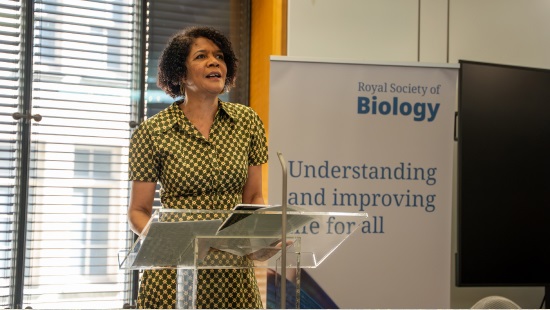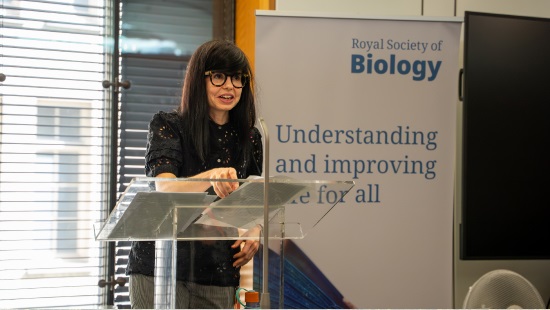News
Over 100 scientists and parliamentarians brought together at Parliamentary Links Day 2025
- Details
- 19 June 2025
MPs, Peers, scientists, and sector leaders came together for Parliamentary Links Day on Wednesday 18 June 2025 at Portcullis House, Westminster.
Organised by the Royal Society of Biology on behalf of the science and technology community, Links Day is the largest science event in the annual Parliamentary events calendar. It brings together scientists, learned societies, and Members of Parliament; we were pleased to see so many MPs and Peers join us this year.
This year’s format was a ‘drop-in’ style featuring speeches from RSB CEO Dr Mark Downs FRSB CSci CBiol, Dame Chi Onwurah MP, and keynote speaker Dr Jess Wade in addition to networking between Parliamentary Steering Group (PSG) members and parliamentarians.
Addressing the room of 140 people, Mark gave a welcome speech highlighting the Government’s recent Spending Review and the UK’s strength in science, technology, and innovation.
He then handed over to Dame Chi Onwurah MP, Chair of the House of Commons Science, Innovation and Technology Select Committee who emphasised the impact that politics and science have on community progress. The UK’s scientific output is world-leading and it occupies a large part of the debates held in Parliament. Dame Chi stated that the national data library will bring together data sets across different sectors which will support evidence-based policy-making and research, and that we need to continue to push forward the boundaries of human knowledge.

Dame Chi Onwurah MP
The keynote speech was then given by award-winning physicist Dr Jess Wade, Royal Society University Research Fellow and Lecturer in Functional Materials in the Department of Materials at Imperial College London. Outside of her research on new materials for quantum technologies, Dr Wade is an advocate for improving diversity in science, both online and offline.
During the keynote speech, Dr Wade addressed that while we are facing some monumental challenges across the world today – pandemics, the climate crisis, cyber-attacks, the use and misuse of AI, to name a few – we are lucky that we have a network of extraordinary Chief Scientific Advisors in the UK and that the Government recognises how important R&D will be in delivering economic growth.
Dr Wade highlighted that there are issues, however, such as access to funding. The UK’s infrastructure also needs a re-think. A recent review by the Royal Academy of Engineering of the UK’s quantum infrastructure found that it was hard to access, difficult to find, and rarely met the standards or capacity required for industry. She also stressed the point of needing to increase the frequency of events such as Links Day and to think about who is given an opportunity to become an innovator, whether that’s navigating how people are enabled to upskill or how people with care responsibilities re-enter the scientific workforce. She stated that the UK’s science and technology sectors need to be open to everyone irrespective of their gender, ethnicity, or socioeconomic background, and that equal opportunities need to be provided.

Dr Jess Wade
Dr Wade finished her speech by noting that the near future will demonstrate immense challenges both internationally and domestically but she’s confident that by working together, academia, learned societies, and policymakers can deliver on the Government’s missions, maintain the UK’s world-leading position in science, and create technologies that benefit everyone in society.
Afterwards, guests were then able to network over food and drinks.
Parliamentary Links Day is organised by the Royal Society of Biology on behalf of the Anatomical Society, Applied Microbiology International, Association of Applied Biologists, Biochemical Society, British Ecological Society, British Pharmacological Society, British Society for Immunology, The Council for the Mathematical Sciences, The Genetics Society, The Geological Society, Institute of Physics, Royal Society of Chemistry, Society for Experimental Biology, and The Society for Radiological Protection.

